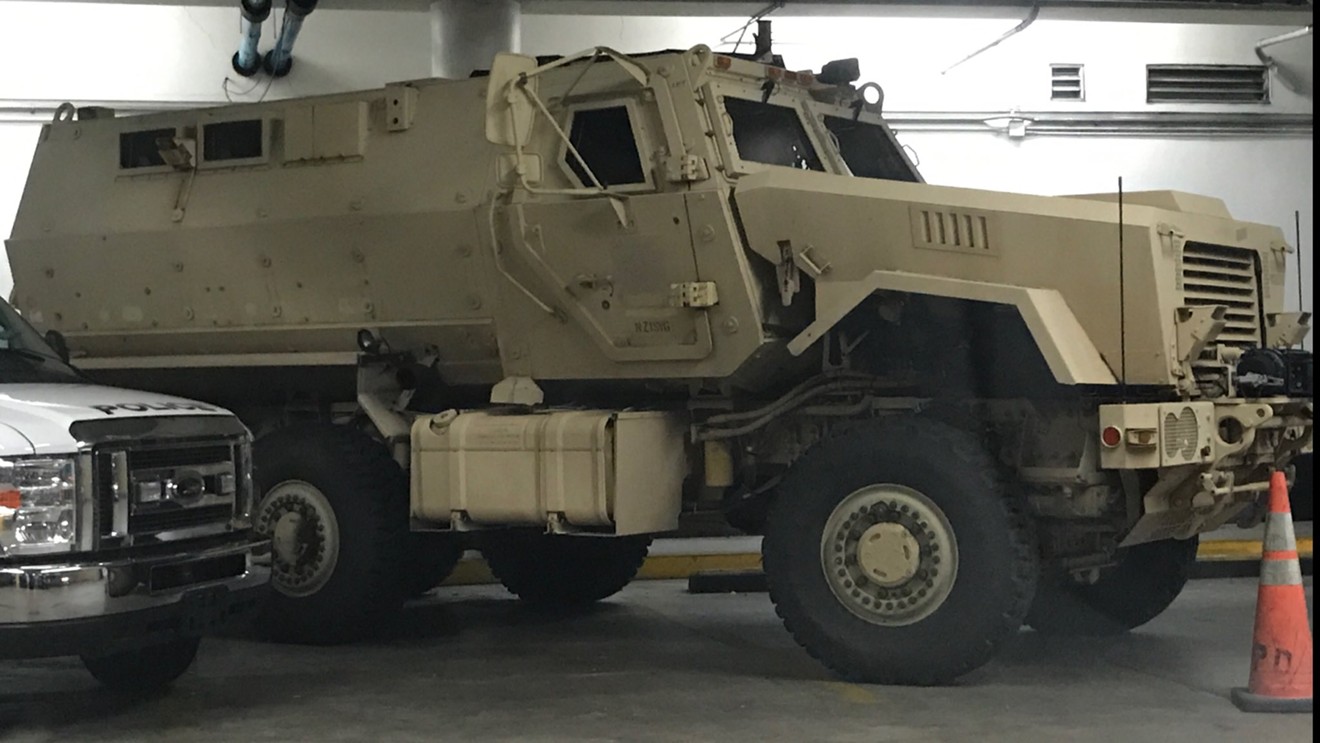The Coral Gables Police Department, which patrols one of the safest, richest parts of Miami-Dade County, inexplicably had two military-grade, tank-like armored trucks called Mine-Resistant Ambush-Protected (MRAP) trucks. The department got the truck from the U.S. Department of Defense, which outfits local police forces with military-grade equipment for free, as long as the cops pay shipping and handling.
Last September, Gables PD tried to "donate" one of those two MRAP vehicles to Miami Beach Police, which at the time had zero military-grade vehicles. The only problem, however, was the DOD doesn't let departments "trade" their equipment. The federal government stopped the trade from happening after DOD officials said they read New Times' story about the switch.
But that didn't stop Beach PD from getting one of these massive trucks. Today MBPD spokesperson Ernesto Rodriguez confirmed to New Times that the department has, indeed, obtained an MRAP truck and that it's in the shop getting a paint job. The Department of Defense confirmed that Coral Gables legally donated one truck to Miami Beach this time.
The news came to light after multiple Beach residents noticed the tank-like truck rolling through town and began to post photos of the behemoth on social media.
Multiple residents said they were worried the truck had been brought in to deal with crowds during Memorial Day weekend, which is less than two weeks away and always brings raucous crowds to South Beach. Though the department in recent years has shut down streets, instituted stricter rules, and rolled out license-plate-reading technology on high-traffic weekends, Rodriguez stressed the department has no plans to use the truck during Memorial Day weekend festivities.
Rodriguez said instead that MBPD had still wanted to get an MRAP truck after being blocked last year by the U.S. Defense Logistics Agency, which oversees the Defense Department's 1033 military-gear program. (Departments that want to obtain federal military gear must first submit applications to the DOD and justify why they need such gear. "Trading" or "donating" an MRAP truck leapfrogs that approval process.)
In September, City Manager Jimmy Morales said the Pulse nightclub shooting in Orlando concerned the department and made Beach cops feel they were unprepared if an active shooter were to strike the city.@MiamiBeachPD moved this military vehicle from Fire Station 2 to the PD station. Prep for MDW2017?? https://t.co/kkOvJ9hlfO @MiamiNewTimes pic.twitter.com/qTUJdowA6c
— Miami Beach Alerts (@BeachNewsAlerts) May 18, 2017
'"In the Pulse nightclub attack, the SWAT team was able to use its SWAT vehicle to breach the premises to confront the attacker and to eliminate the threat," Morales wrote in a memo to the city commission. He later wrote, "The Miami Beach Police Department (MBPD) does not currently have the capability highlighted above. Presently, the MBPD would need to rely on either the City of Miami Police Department or the Miami-Dade Police Department to take on the task of driving into a flooded area or high-threat zone. The MBPD estimates that it would take an hour or more to deploy such a vehicle from the mainland."
Police union president Bobby Jenkins also applauded the city for trying to get a gigantic mine-resistant truck.
The Miami Beach FOP is appreciative of the City’s willingness to recognize the fact that there may be a time when a vehicle such as this may be necessary to save lives. While we do not expect this vehicle to be used for routine calls for service, we also understand that we are living in different times that sometimes require us to consider different courses of action. These tools give us the ability to respond to crisis scenarios, such as an active shooter or an environmental disaster, in the safest and most expeditious manner possible. When the lives of citizens and officers are at stake, the old adage of 'better to have it and not need it than to need it and not have it' comes to mind. The men and women of the Miami Beach FOP are dedicated to protecting the lives and property of all who come within our jurisdiction in a safe, friendly and constitutional manner.But, as with all police-militarization issues, there are questions as to what rules govern the MRAP's usage and whether the so-called emergency vehicle will be used to patrol routine events such as peaceful protests.
Numerous civil rights groups, including the American Civil Liberties Union, have questioned why local police ought to be outfitted like soldiers when patrolling local protests or demonstrations. While Beach police say they requested their MRAP truck to combat a possible active shooter, a 2016 Mother Jones review of 450
"This is a great example of how police as an institution talk to each other privately, versus how they talk to the public and journalists who might raise questions about what they're doing with this equipment," Peter Kraska, a professor at Eastern Kentucky University and expert on police spending, told the magazine. "When police are pressured in public, they're going to say, 'How about Columbine?' or point to all these extremely rare circumstances."
Scores of local activists have reported seeing MRAP trucks show up at peaceful demonstrations, and say local cops' usage of military equipment can have a "chilling" effect on protesters.
In 2014, a representative from the ACLU told NPR that local departments ought to request public hearings before they try to get military-grade equipment from the Defense Department. MRAP vehicle requests have sparked fights in other towns across the nation.
But though President Barack Obama didn't particularly do a lot to end the War on Drugs or police militarization, the debate over whether local cops ought to have vehicles designed for war zones is now exponentially more important, given the Trump administration's repeated promises to ratchet up immigrant arrests, the War on Drugs, and police spending.












